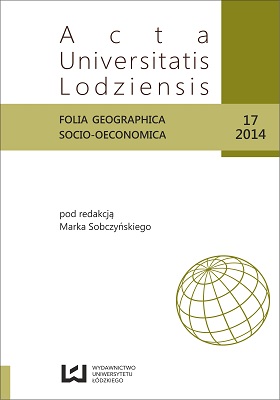New governance in Dutch antilles
DOI:
https://doi.org/10.18778/1508-1117.17.11Keywords:
Caribbean Netherlands, Netherlands Antilles, new political status, EU overseas territoriesAbstract
As a result of the constitutional reform carried out in the Kingdom of the Netherlands in October 2010, existing Netherlands Antilles have been resolved. Currently, the Kingdom of the Netherlands consists of four autonomous states: the Kingdom of the Netherlands, Aruba, Curaçao and Sint Maarten, along with three special municipalities: Bonair, Sint Eustatius and Saba (BES). The special municipalities now bear the name of the Caribbean Netherlands (Caribisch Nederland). The new autonomous countries have their own governments and parliaments. Special municipalities have two levels of authorities. The first one representing the central authorities of the Kingdom of the Netherlands and the second, local authority exercised by the representatives of the Islands Council (Eilandsraad). The head of the state is King Willem-Alexander. The foreign policy and defense of the Caribbean Netherlands remain the responsibility of the Kingdom of the Netherlands with one Minister of Foreign Affairs and one single foreign service. The countries Aruba, Curaçao and Sint Maarten have their Foreign Affairs Departments. On Sint Maarten, this name is a bit different and sounds more like “Department” of Foreign Affairs. Effective 1 January 2011 for Bonaire, Sint Eustatius and Saba, the official tender became the U.S. dollar. In the countries of Curaçao and Sint Maarten, the Antillian Guilder (Antilliaanse Gulden) remains in circulation until the Caribbean Guilder will be introduced. The Kingdom of the Netherlands is a member of the European Union. Aruba, Curaçao and Sint Maarten have the status of overseas countries and territories of the EU and, thus, are not part of the EU. The name Caribbean Netherlands does not include autonomous countries and it refers only to those Caribbean islands that are administrative divisions of the Kingdom of the Netherlands. The name Dutch Caribbean refers to all the Caribbean islands within the Kingdom of the Netherlands.
References
Balicki J., Bogucka M., 1989, Historia Holandii, Ossolineum, Wrocław.
Google Scholar
Bormann C., 2005, Het Statuut voor het Koninkrijk door…, Kluwer
Google Scholar
Boxer Ch.R., 1980, Morskie imperium Holandii 1600–1800, Wydawnictwo Morskie, Gdańsk.
Google Scholar
Buddingh H., 1995, Geschiedenis van Suriname, Het Spectrum, Utrecht.
Google Scholar
Dold L. (red.), 2001, Atjeh. De verbeelding van een koloniale oorlog, Uitgeverij Bert Bakker, Amsterdam
Google Scholar
Ferro M., 1997, Historia Kolonizacji, Bellona, Warszawa.
Google Scholar
Głowacki A., 2003, Konstytucja Królestwa Holandii, Tłumaczenie i wstęp…, Wydawnictwo Sejmowe, Warszawa.
Google Scholar
Goslinga C.Ch., 1985, The Dutch in the Caribbean and in the Guianas 1680–1791, Van Gorcum and Co., Assen
Google Scholar
Hoff M.C., 1998, Het misplaatste Oranje Boven-gevoel. Het falen van het militaire systeem in Nederland en Nederlands-Indië: 1825–1995, Longman, Amsterdam.
Google Scholar
Laskowska N., 2012, Indonezja, Seria: Historia państw świata w XX i XXI wieku, Wydawnictwo TRIO, Warszawa.
Google Scholar
Oostindie G., Klinkers I., 2001, Het Koninkrijk in de Caraïben. Een korte geschiedenis van het Nederlandse dekolonisatiebeleid 1940–2000, Amsterdam University Press, Amsterdam.
Google Scholar
DOI: https://doi.org/10.5117/9789053564660
„Rijkswet Staatsblad”, 1985, nr 664.
Google Scholar
Sobczyński M., 2006, Państwa i terytoria zależne. Ujęcie geograficzno-polityczne, Wydawnictwo Adam Marszałek, Toruń.
Google Scholar
Sroka A., 2008, Hiszpańska droga do federalizmu, Wydawnictwo Uniwersytetu Wrocławskiego, Wrocław.
Google Scholar
„Staatsblad van het Koninkrijk der Nederlanden”, 1985, nr 665.
Google Scholar
Vandeputte O., Koch J., 1995, Niderlandzki. Język dwudziestu milionów Holendrów i Flamandów, Stichting Ons Erfdeel vzw, Rekkem
Google Scholar
Wesseling H.L., 1995, Indië verloren, ramspoed geboren en andere opstellen over de geschiedenis van de Europese expansie, Ooievaar Pockethouse, Amsterdam.
Google Scholar
Zumthor P., 1968, Życie codzienne w Holandii, Państwowy Instytut Wydawniczy, Warszawa.
Google Scholar
Żelichowski R. (red.), 2011, Terytoria zamorskie Wielkiej Brytanii, Francji, Niderlandów oraz europejskie terytoria specjalne a Unia Europejska, ISP PAN, Warszawa, s. 79–108.
Google Scholar
Downloads
Published
How to Cite
Issue
Section
License

This work is licensed under a Creative Commons Attribution-NonCommercial-NoDerivatives 4.0 International License.








